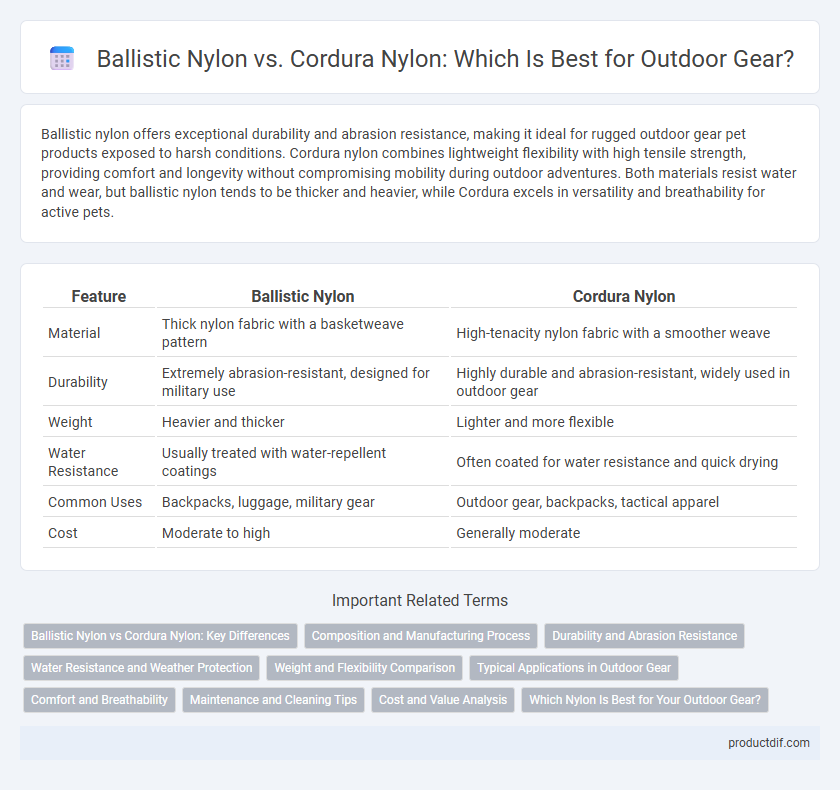Ballistic nylon offers exceptional durability and abrasion resistance, making it ideal for rugged outdoor gear pet products exposed to harsh conditions. Cordura nylon combines lightweight flexibility with high tensile strength, providing comfort and longevity without compromising mobility during outdoor adventures. Both materials resist water and wear, but ballistic nylon tends to be thicker and heavier, while Cordura excels in versatility and breathability for active pets.
Table of Comparison
| Feature | Ballistic Nylon | Cordura Nylon |
|---|---|---|
| Material | Thick nylon fabric with a basketweave pattern | High-tenacity nylon fabric with a smoother weave |
| Durability | Extremely abrasion-resistant, designed for military use | Highly durable and abrasion-resistant, widely used in outdoor gear |
| Weight | Heavier and thicker | Lighter and more flexible |
| Water Resistance | Usually treated with water-repellent coatings | Often coated for water resistance and quick drying |
| Common Uses | Backpacks, luggage, military gear | Outdoor gear, backpacks, tactical apparel |
| Cost | Moderate to high | Generally moderate |
Ballistic Nylon vs Cordura Nylon: Key Differences
Ballistic nylon offers superior abrasion resistance and durability due to its dense weave and thick fiber composition, making it ideal for heavy-duty outdoor gear. Cordura nylon features a balanced combination of lightweight flexibility and high tensile strength, favored for backpacks and tactical equipment that require both toughness and portability. Understanding the distinction between ballistic nylon's rugged protection and Cordura's versatile performance helps select the right material for specific outdoor applications.
Composition and Manufacturing Process
Ballistic nylon is a thick, tough fabric originally developed by DuPont, made from high-denier nylon yarns woven tightly for enhanced abrasion resistance and durability, often coated with a resin for extra protection. Cordura nylon is also made from high-tenacity nylon fibers but utilizes a more complex, multi-filament weaving technique that creates a lighter, more flexible fabric with excellent tear resistance and water repellency. The manufacturing process of ballistic nylon emphasizes a dense weave and added resin finishes, while Cordura focuses on optimizing fiber strength and fabric breathability through advanced textile engineering.
Durability and Abrasion Resistance
Ballistic nylon, originally developed for military body armor, offers exceptional durability and high abrasion resistance due to its tightly woven construction and thick fibers. Cordura nylon, known for its lightweight yet tough fabric, delivers superior abrasion resistance through its specialized fiber technology and is often preferred in outdoor gear for its balance between strength and flexibility. Both materials excel in durability, but ballistic nylon is typically thicker and more resistant to punctures, while Cordura provides enhanced versatility in rugged environments.
Water Resistance and Weather Protection
Ballistic nylon offers moderate water resistance due to its dense weave and PU coating, making it suitable for light rain and damp conditions. Cordura nylon features superior water resistance and enhanced weather protection thanks to its advanced fabric treatments and durable water-repellent (DWR) finish. Outdoor gear crafted with Cordura nylon generally provides better performance against heavy rain, wind, and abrasion compared to ballistic nylon.
Weight and Flexibility Comparison
Ballistic nylon offers exceptional durability with a heavier weight, typically around 18 to 22 ounces per square yard, making it less flexible than Cordura nylon. Cordura nylon, known for its lighter weight ranging from 6 to 12 ounces per square yard, provides superior flexibility and ease of movement, ideal for lightweight outdoor gear. These weight and flexibility differences influence gear choice based on the need for toughness versus comfort and mobility.
Typical Applications in Outdoor Gear
Ballistic nylon is commonly used in heavy-duty outdoor gear like backpacks and protective cases due to its exceptional abrasion resistance and durability. Cordura nylon, favored for lighter outdoor equipment such as tents, clothing, and daypacks, offers a balance of toughness and flexibility with water resistance. Both materials are integral in designing gear that withstands harsh outdoor conditions, with Ballistic nylon excelling in impact protection and Cordura in versatility and weight savings.
Comfort and Breathability
Ballistic nylon offers exceptional durability but tends to be heavier and less breathable, making it less comfortable for prolonged wear in outdoor gear. Cordura nylon, known for its lightweight and enhanced breathability, provides superior comfort by allowing better air circulation during extended activities. Choosing Cordura nylon results in gear that balances toughness with ventilation, essential for comfort in variable outdoor environments.
Maintenance and Cleaning Tips
Ballistic nylon requires gentle cleaning with mild soap and water to preserve its dense weave and water-resistant coating, while avoiding harsh detergents that can degrade its durability. Cordura nylon benefits from regular brushing to remove dirt and the use of mild detergent solutions for spot cleaning, maintaining its abrasion resistance and color vibrancy. Both materials should be air-dried away from direct sunlight to prevent fiber weakening and color fading, extending the lifespan of outdoor gear.
Cost and Value Analysis
Ballistic nylon is often less expensive than Cordura nylon, providing a cost-effective solution for durable outdoor gear with decent abrasion resistance. Cordura nylon commands a higher price due to its superior strength, durability, and resistance to tears and scuffs, offering long-term value for heavy-duty applications. Evaluating the cost-to-performance ratio favors Ballistic nylon for budget-conscious buyers, while Cordura nylon suits those prioritizing longevity and rugged use.
Which Nylon Is Best for Your Outdoor Gear?
Ballistic nylon offers superior abrasion resistance and durability, making it ideal for rugged outdoor gear subjected to intense wear and tear. Cordura nylon provides excellent strength combined with greater flexibility and water resistance, preferred for backpacks and apparel requiring lighter weight and comfort. Choosing between Ballistic and Cordura nylon depends on whether priority lies in maximum toughness or balanced performance for versatile outdoor activities.
Ballistic nylon vs Cordura nylon Infographic

 productdif.com
productdif.com